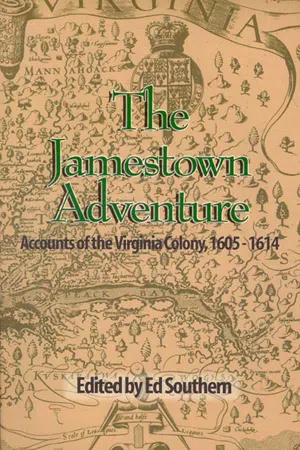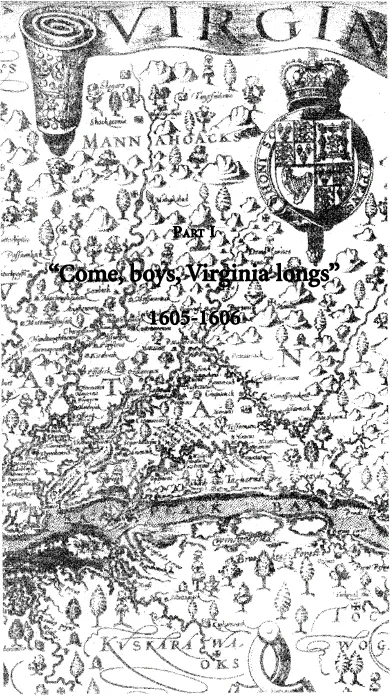![]()
![]()
From Eastward Hoe,
by George Chapman, Ben Jonson, and John Marston1
Eastward Hoe was performed by the Children of Her Majesty’s Revels (one of whose shareholders would later be secretary of the Jamestown colony) at the Blackfriars theater in London sometime after Christmas 1604. The play’s ridicule of Scots (not a good idea, since James I of England had been James VI of Scotland first) earned the Roman Catholic Jonson a second stay in prison, which evidently helped him see the true light of the Anglican Church.2 The plot of the comedy borrows heavily from the story of the Prodigal Son, but our concern is with the second scene of the third act, in which a blowhard “Captain” seduces two Londoners with fantastic stories of the fabulous riches of Virginia.3
The English had yet to establish a successful foothold in America. The aggressive expansionism of Elizabeth had been replaced with the cautious pacifism of James, and Virginia expeditions were becoming something of a joke. That includes the expedition now known as the Lost Colony, to which the play refers, albeit by the wrong date. Details aside, the mention shows that the mystery of the colonists’ fate occupied a place in the English consciousness; they were lost, but not forgotten.
From Act 3, Scene 2
Enter Seagull, Spendall, and Scapthrift in the Tavern with a Drawer.
Seagull: Come Drawer, pierce your neatest hogshead, and let’s have cheer, not fit for your Billingsgate Tavern, but for our Virginia Colonel; he will be here instantly.
Drawer: You shall have all things fit, sir; please you have any more wine?
Spendall: More wine, slave? Whether we drink it or no, spill it, and draw more.
Scapthrift: Fill all the pots in your house with all sorts of liquor, and let ’em wait on us here like soldiers in their pewter coats; and though we do not employ them now, yet we will maintain ’em, till we do.
Drawer: Said like an honorable captain; you shall have all you can command, sir.
Exit Drawer.
Seagull: Come, boys, Virginia longs till we share the rest of her maidenhead.
Spendall: Why, is she inhabited already with any English?
Seagull: A whole country of English is there, man, bred of those that were left there in ’79. They have married with the Indians, and make ’em bring forth as beautiful faces as any we have in England. And therefore the Indians are so in love with ’em, that all the treasure they have, they lay at their feet.
Scapthrift: But is there such treasure there, Captain, as I have heard?
Seagull: I tell thee, gold is more plentiful there than copper is with us. And for as much red copper as I can bring, I’ll have thrice the weight in gold. Why, man, all their dripping pans, and their chamber pots are pure gold; and all the chains, with which they chain up their streets, are massie [massive] gold. All the prisoners they take are fettered in gold; and for rubies and diamonds, they go forth on holidays and gather ’em by the seashore, to hang on their children’s coats, and stick in their caps, as commonly as our children wear saffron-gilt brooches, and groats [kernels] with holes in ’em.
Scapthrift: And is it a pleasant country withall?
Seagull: As ever the sun shine on, temperate and full of all sorts of excellent viands. Wild boar is as common there as our tamest bacon is here; venison, as mutton. And then you shall live freely there, without sergeants, or courtiers, or lawyers, or intelligencers … Then for your means to advancement, there, it is simple, and not preposterously mixed: you may be an alderman there, and never be scavenger; you may be a nobleman, and never be a slave; you may come to preferment enough, and never be a pander; to riches and fortune enough, and have never the more villainy, nor the less wit.
Spendall: Gods me! And how far is it thether?
Seagull: Some six weeks’ sail, no more, with any indifferent good wind. And if I get to any part of the coast of Africa, I’ll sail thether with any wind. Or when I come to Cape Finister, there’s a fortnight wind continually wafts us till we come at Virginia.4
NOTES
1. Chapman, George, Ben Jonson, and John Marston, Eastward Hoe, edited with an introduction, glossary, and notes by Julia Hamlet Harris, (New Haven: Yale University Press, 1926), 44-47.
2. Palmer, Alan and Veronica. Who’s Who in Shakespeare’s England (New York: St. Martin’s Press, 1999), 136.
3. Chapman, George, Ben Jonson, and John Marston, ix.
4. Cape Finister, at the northwest corner of the Iberian peninsula, was a common landmark for northern European ships setting off across the Atlantic. It marked the general point at which the ships changed course to the west.
![]()
From
“Instructions given by way of advice by us whom it hath pleased the King’s Majesty to appoint of the council for the intended voyage to Virginia, to be observed by those captains and company which are sent at this present to plant there.”1
The original royal charter of the Virginia Company, granted in 1606, called for a London-based council to manage the colony through a second council based in Virginia. The council in London, whose members were the company’s leading investors and included some of the most powerful men in the kingdom, answered directly to the king’s Privy Council.2 Relations between the Virginia council and the king were strained at the best of times. The youth of James I had been marked by violent death, including the execution of his mother Mary, Queen of Scots, by his predecessor Elizabeth. He had no enthusiasm for provoking the still-powerful Spanish; one of his first acts as king was to formalize a peace with Philip III of Spain. This pacifism, combined with a lack of interest in sea power and a visceral aversion to tobacco, made the king suspicious of the whole Virginia venture, particularly its roots in the “remnants of Elizabeth’s old order.”3
One of those remnants was the clergyman, scholar, and unflagging propagandist Richard Hakluyt. Though he never left the island himself, Hakluyt was an early and devoted proponent of England’s exploration of and claims to foreign lands. From his student days he read everything he could (which was a lot, since he could read six languages) about the Age of Discovery in which he found himself. Later he would compile and edit these accounts for publication in a series of books, which are credited with “doing most to put England in an empire-building vein” and made the non-seafaring Hakluyt the leading authority on foreign lands.4
Hakluyt was one of the original Virginia Company shareholders; the council’s instructions undoubtedly drew heavily from his accumulated knowledge. These instructions cover every possible contingency, from the placement and governance of the new town, to relations with the Indians, to the most likely place to find the long-sought route to the South Seas. The colonists would discover how well these instructions fit the realities of Virginia.
As we doubt not but you will have especial care to observe the ordinances sent down by the King’s Majesty and delivered unto you under the privy seal, so for your better directions upon your first landing we have thought good to recommend unto your care these instructions and articles following.
When it shall please God to send you on the coast of Virginia, you shall do your best endeavor to find out a safe port in the entrance of some navigable river making choice of such a one as runneth farthest into the land, and if you happen to discover divers portable rivers, and amongst them any one that have two main branches, if the difference be not great make choice of that which bendeth most toward the northwest for that way you shall soonest find the other sea.
When you have made choice of the river on which you mean to settle be not hasty in landing your victuals and munitions, but first let Captain Newport discover how far that river may be found navigable that you make election of the strongest, most wholesome and fertile place for if you make many removes, besides the loss of time, you shall greatly spoil your victuals and your casks, and with great pain transport it in small boats.
But if you choose your place so far up as a bark of 50 tons will float then you may lay all your provisions ashore with ease, and the better receive the trade of all the countries about you in the land, and such a place you may perchance find a hundred miles from the river’s mouth, and the further up the better, for if you sit down near the entrance, except it be in some island that is strong by nature, an enemy that may approach you on even ground may easily pull you out, and if he be driven to seek you a hundred miles the land in boats you shall from both sides of the river where it is narrowest so beat them with your muskets as they shall never be able to prevail against you.
And to the end that you be not surprised … you shall do well to make this double provision: first erect a little store at the mouth of the river that may lodge some ten men, with whom you shall leave a light boat, that when any fleet shall be in sight they may come with speed to give you warning. Secondly you must in no case suffer any of the native people of the country to inhabit between you and the sea coast, for you cannot carry yourselves so towards them but they will grow discontented with your habitation, and be ready to guide and assist any nation that shall come to invade you, and if you neglect this you neglect your safety.
When you have discovered as far up the river as you mean to plant yourselves and landed your victuals and munitions … You shall do well to divide your six score men into three parts, whereof one party of them you may appoint to fortify and build of which your first work must be your storehouse for victual; the other you may employ in preparing your ground and sowing your corn and roots; the other ten of these forty you must leave as sentinel at the haven’s mouth. The other forty you may employ for two months in discovery of the river above you, and on the country about you, which charge Captain Newport and Captain Gosnold may undertake of these forty discoverers; when they do espy any high lands or hills Captain Gosnold may take 20 of the company to cross over the lands and carrying a half dozen pickaxes to try if they can find any minerals. The other twenty may go on by river, and pitch up boughs upon the bank’s side by which the other boats shall follow them by the same turnings. You may also take with them a wherry [a light rowboat used for one person] such as is used here in the Thames, by which you may send back to the president for supply of munition or any other want that you may not be driven to return for every small defect.
You must observe if you can whether the river on which you plant doth spring out of mountains or out of lakes; if it be out of any lake the passage to the other sea will be the more easy. It is like enough that out of the same lake you shall find some spring which run the contrary...



